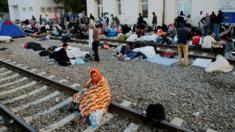Europe
Key Greece election on a knife edge
- 18 September 2015
- Europe
 Getty Images
Getty Images
The Greek election on 20 September will be the third vote in 2015 (after the general election of January and the referendum in July) and the fifth general election in six years.
The polls are currently neck-and-neck between the left-wing Syriza, led by former Prime Minister Alexis Tsipras, and the right-wing New Democracy, led by Vangelis Meimarakis.
Background:
The vote was called by Mr Tsipras last month in an attempt to give him a popular mandate following his controversial agreement with European creditors in exchange for a vital third bailout package.
However, with any future Greek government now committed to those agreed austerity measures, the main feature of this election is indifference and confusion among the electorate.
The elections are also taking place in a climate of economic malaise, with the economy having suffered substantially in the first half of 2015 due to political uncertainty and consumer anticipation of further austerity.

The electoral system:
This election, organised by a caretaker government, will take place under a closed-list system, meaning individual candidates do not campaign, since the order of preference in constituency lists is determined by party leaders.
Under Greek electoral law, 250 of the 300 seats in parliament are allocated, according to proportional representation, to each party that clears a 3% threshold, with the winning party receiving a 50-seat bonus.
 Reuters
Reuters
If all parties running were to clear the threshold, a vote share of about 40% would be needed to gain an outright majority (151 seats).
But the share needed for a majority drops according to how many parties fail to enter parliament.
Based on previous Greek elections, it is expected that about 10% of votes will go to parties that remain outside parliament, reducing the majority vote share to about 36%.
It seems very unlikely that any of the two major parties will manage to cross this threshold.
Polls close at 19:00 local time (17:00 BST), after which all major Greek TV stations will broadcast their exit polls.
Unless results are very close, it will be safe to gauge the critical aspects of the result (which party comes first, which parties enter parliament, distribution of seats) by about 22:00 local time.

The political landscape:
When the elections were called, a Syriza majority was not out of the question.
However, the party suffered a split following its pro-austerity turn, giving rise to a new anti-austerity party - the Popular Unity (LAE) - which competes with the Communist Party (KKE) for the vote to the left of Syriza.
Mr Tsipras, the dominant figure in Greek politics since he came to power, has been tarnished by disagreements with his old comrades, making a further split in his party a possibility after the election.
 PA
PA
The pro-European centre-left is less fragmented than in recent years, as the party of former Prime Minister George Papandreou will not contest these elections.
This leaves PASOK and To Potami as the sole representatives of this camp.
The right wing of the political spectrum includes:
- the moderate pro-European centre-right New Democracy
- the populist anti-austerity Independent Greeks (ANEL) (who, however, also voted for the bailout)
- the extreme right of "neo-Nazi" Golden Dawn
New Democracy has conducted a much more enthusiastic campaign than many expected and is benefiting from the down-to-earth style of its interim leader, Vangelis Meimarakis.

The polls:
Opinion polls paint an image of a neck-and-neck race.
However, most voters who have not declared their intention yet are old Syriza voters and it would be a major surprise were the party not to top the polls.
Other trends include the steady positioning of Golden Dawn in third place, the surprising surge of PASOK and loss of support for To Potami.
LAE have failed to gain traction and, along with ANEL, may struggle to clear the 3% threshold.
Eternal outsider Vassilis Leventis' Union of Centrists finally seems set to secure parliamentary representation.
Depending on how smaller parties fare, the next parliament could have as many as nine parties.

The issues:
The campaign is dominated by the economy.
Mr Tsipras presents himself as the "new" that will keep the "old" parties from coming back to power, while emphasising his struggle to improve the terms of the Greek bailout against overwhelming odds.
The pro-European opposition accuses him of a failed negotiating strategy that cost the Greek economy dearly, while emphasising the need of building a broad coalition government to deal with Greece's problems.
The anti-austerity left accuses Mr Tsipras of betraying the "No" vote of the July referendum.
Lurking in the background is the issue of migration.
The islands of the Eastern Aegean that were the hotspots of the migrant crisis this summer have traditionally been left-leaning, so a surge of the Golden Dawn vote there (as well as in poorer urban areas) would be a strong indication that migration has impacted the election much more than media coverage and major party campaigning would suggest.

The result:
The question of voter turnout is interesting, bearing in mind that many voters must return to their province of origin in order to place their vote.
Election fatigue, the neutralisation of the austerity question, economic weariness, and distrust of politicians and the mainstream media will probably all conspire to depress the turnout rate.
All parties (and particularly the two major ones) will almost certainly have fewer votes in absolute numbers than in January.
Whether Syriza or New Democracy comes first and gains the 50-seat bonus, the margin of difference between them, the number of parties that will enter parliament, and the size of the vote for non-parliamentary parties will all affect the process and outlook of government formation after the election.
But whatever the outcome, it will probably generate very little confidence among the Greek people.

The consequences:
A strong Syriza victory will result in Mr Tsipras again becoming prime minister, though it cannot be predicted who his partners would be.
A marginal Syriza victory will result in more protracted and complicated coalition negotiations.
 AP
AP
In this case, which and how many parties will participate in government and under what terms (formal cabinet membership or parliamentary support), and who will become prime minister all are unpredictable.
Under this scenario, a more moderate Syriza figure, such as Giannis Dragasakis, would be a likelier contender for the top job.
Any stable coalition government would require a strong parliamentary majority and at least the tacit support of Syriza.
Were New Democracy to top the polls, they may decide to appoint as prime minister a more centrist figure than leader Vangelis Meimarakis, in exchange for Syriza support.
Paradoxically a New Democracy victory may prove more destabilising for Greece's prospects in the eurozone, as it will make it difficult for Mr Tsipras to convince a humiliated Syriza to take even partial ownership of the austerity to come.
Angelos Chryssogelos is an academy senior fellow at Chatham House.

















No comments:
Post a Comment
Please leave a comment-- or suggestions, particularly of topics and places you'd like to see covered